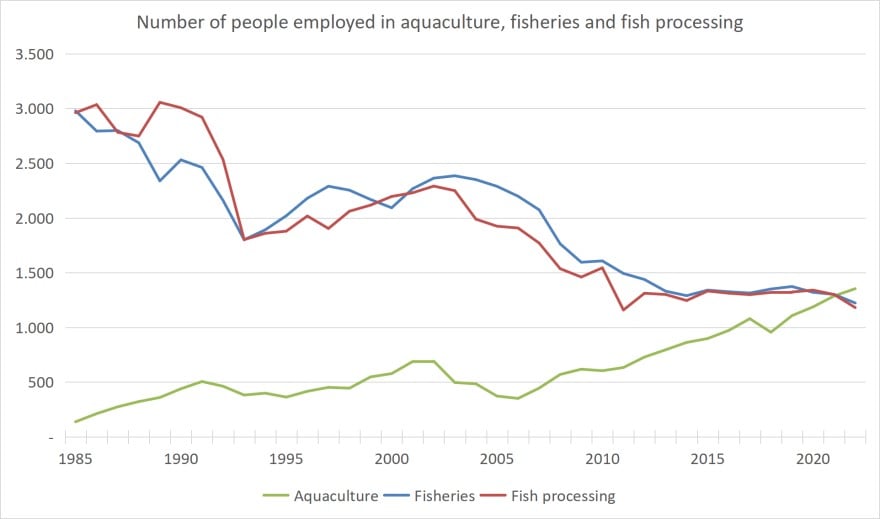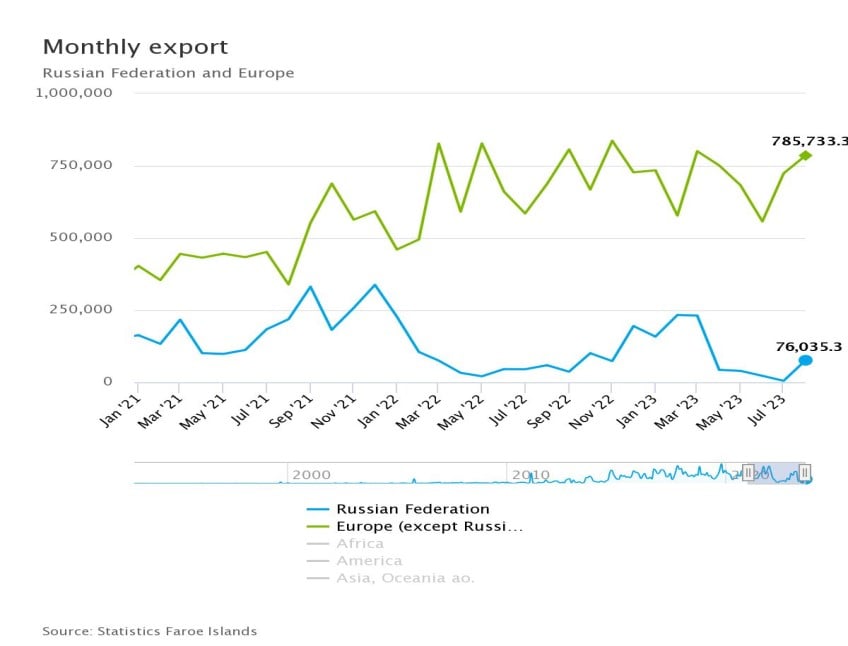The Faroese economy is based largely on modern fishing and aquaculture industries, which produce high quality fish products for export.
Fishing
The Faroese fishing fleet's landings of catches primarily occur in Faroese ports. However, when the fish meal factories in the Faroese ports are working above their processing capacity, the pelagic catches are landed in the ports of neighbouring countries (e.g. Iceland, Scotland, and Norway).
The Faroese economy is highly
dependent on commercial fisheries and aquaculture. Although the economic
importance of the fisheries has decreased, it still represents about 10% of GDP
(see figure 6). The aquaculture industry contributes approximately 16% of
the GDP. In recent years,
exports from the aquaculture industry have been around 40–45 percent of
the total exports of goods and around 27% of the total income on the balance of
payments (see Aquaculture
Overview Faroes Ecoregion,
ICES, 2023).
Employment in the fisheries industry has gradually decreased since 1985 and now represents about 50% of historic levels. Nevertheless, employment in the fisheries sector still represents about 10% of the total workforce. Currently 2 600 individuals are employed in the Faroese fishing industry, and it remains of importance especially in small towns and villages. The employment in aquaculture has increased over time making aquaculture an increasingly important industry in the Faroe Islands.

(Source: Statistics Faroe Islands, Statbank database).
Specific socio-economic drivers
COVID-19 pandemic
In March 2020 the COVID-19 pandemic started and exerted a significant impact on Faroese fisheries, primarily because of low prices and shifting demand in the international market. Specifically, exports to Italian and Spanish markets were adversely affected during the pandemic although exports to the remaining European market (which receives most Faroese exports) picked up several months into the pandemic. National lockdown regulations did not influence the fishing or processing industry significantly. However, the long-term and multidimensional impacts on the seafood sector are currently under research.
Geopolitical drivers
In January 2021 the United Kingdom left the EU and became an independent coastal state with full jurisdiction over its EEZ. A major challenge currently facing the ecoregion, as well as neighbouring ecoregions, is to secure bilateral and international fisheries agreements that ensure the sustainability of jointly shared fish stocks.
Since February 2022, geopolitical change in Europe has led to disruption in the international energy market resulting in rising fuel prices. Consequently, the operating costs of commercial trawlers have increased, particularly demersal trawlers as a result of the high fuel requirements associated with bottom-towed gear. In addition, associated to this geopolitical change, exports of fish products to Russian Federation have generally declined, while exports to Europe have increased.

(Source: Statistics Faroe Islands, Statbank database).
Whale hunting
Whale hunting is a traditional practice in the Faroe Islands. It has been carried out for centuries as a source of food for the local population. The regular arrivals of pods of pilot whales, was and still is essential for local communities in the Faroe Islands culturally, socially and economically.
Although whale hunting provides a source of sustenance for certain local communities, it does not generate substantial economic revenue. The export of whale products is restricted by the Faroese government, resulting in a very small economic value in terms of international trade.

